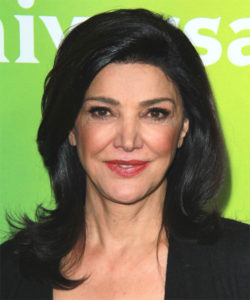January 22, 2021

. . . plays an Afghan
Oscar nominee Shohreh Aghdashloo is appearing in a new film in which one character helps treat dementia patients with music—just as Aghdashloo herself once treated her father’s dementia with music.
In the new Canadian drama, “The Cuban,” Aghdashloo plays Bano, the Afghan aunt of Mina, a plucky pre-med student. Mina cares for the title character, Luis Garcia (played by Oscar-winner Louis Gossett Jr.), a jazz musician and forgotten legend now living in an assisted living facility. He is being treated for vascular dementia and Alzheimer’s. Mina uses music (and food) to care for Luis, who responds to her treatment, much to the chagrin of the administrators.
Aghdashloo’s character, a doctor, is a now an administrator in the facility. She worries about her niece making bad decisions — not just in how Mina is ignoring protocol in caring for Luis, but also that she is neglecting her studies and spending time with a boyfriend, Kris.
As Mina is helping Garcia remember his better days as a performer, Bano is confronted with her past.
Salon magazine says Aghdashloo, who executive produced “The Cuban,” steals the film “with her flinty performance. It is not just the Oscar-nominated actress’ deep raspy voice that demands attention, it is her entire presence. She is alternately conspiratorial, whispering to Mina about their cousins, and commanding as when she confronts Mina about her behavior. And while Bano may be tough as nails, she does show moments of vulnerability.”
Aghdashloo told Salon she was taken by the script because “I had the same experience with my own father. Ten years ago, my father shows signs of Alzheimer’s…. At a family reunion he was totally out of it. He said it was like meeting for the first time. My brother, who is a doctor, put on Persian music, and my father came to life. He knew everyone, and the name of the song. It was one of those golden moments: we had dad back; he recognized us. My brother kept playing Persian music.
“But I didn’t put this together. I wasn’t able to think that the music had an amazing effect on people with Alzheimer’s. It worked with my father. I thought it was just a personal experience.” When she was shown the script, “I was in tears. I said not only do I want to do the film, but I also want to executive produce it because it’s a jewel.
“It will help millions of patients with Alzheimer’s and dementia. It works and is a new way to take care of people. We’re not taking mental health seriously. Playing music for patients—even those being taken care at home—it is better than leaving the patient alone dealing with his or her misery. Play music they are familiar with to take them back to good old days and give them food they are familiar with. Don’t change their habits, but help them find themselves, and make them feel like they are still living in this world.”
She said, “When you migrate, the first thing you try to do is disconnect with the past. They say if you think about the past you are depressed. If you think about the future, you are anxious. Think about now, this moment, and you are a normal person.”
She said her Afghan character, Bano, “feels the same way. When you change countries, it means you want to change your life, so you don’t want to come across points of references that will take you back and remind you of the serene, beautiful life or rough time you had in your [old] country. The best and worst will connect you to the past and none of it can help your life today. Those people try to cut the past right away and not worry about the future. Get yourself acclimated and get educated.”
She said the last 18 years, since she drew national attention with her Oscar-nominated performance in “House of Sand and Fog,” has been extremely busy. “I’ve barely had vacation!”
“The Cuban” is available virtually and was released in select theaters July 31.
